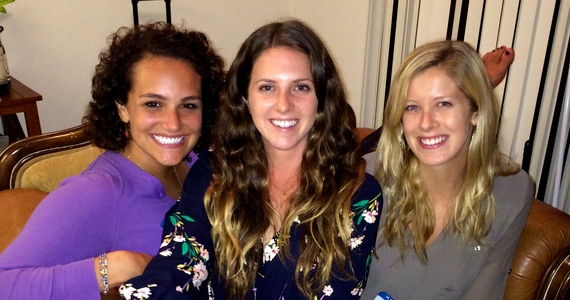When I take time off from exercising, my first workouts are always spent grabbing my side that's knotted with cramps.
When I stop speaking French for awhile (which I've been practicing since 8th grade), I struggle to answer a simple "Ça va?"
When I can't drive for weeks following surgery, it's like I'm 15 years old in a parking lot with my parents all over again.
If you don't use it, you lose it.
So many things require conscious practice to maintain a certain level of skill for them. Thankfulness is one of them.
Thankfulness isn't a symptom of any cancer treatments. I checked all of the "common side effects of..." lists I was given before beginning a new treatment and "feeling grateful" can't be found between fatigue and hair loss. Chemotherapy made me feel nauseous, exhausted, and in pain, but it never made me feel thankful. Surgery left me sore, disfigured, and hardly looking human, but it didn't leave me giving thanks. Radiation burned and scarred my skin, wore me out, but once again, feeling thankful was not a side effect I experienced.
With my cancer diagnosis came more days of misery and suffering than I ever imagined possible. But the very same diagnosis also brought me more feelings of thankfulness than I ever knew existed. I don't know the science behind why some people are constantly drinking from a glass that's half full and others always find their glass half empty, but I do believe that the way we view the content in our cups isn't permanent. So how does one "control" how full or empty their glass is? With practice.
When I stopped wanting to go to chemo, I pow-wowed with friends on the pool deck of an elementary school to come up with 100 reasons why I was thankful cancer happened. If I had zero gratitude to express for how disgusting I felt, what could I appreciate? Well for starters, a group of my friends hiked the Grand Canyon in honor of my fight for 26 miles. My parents moved across the country to take care of me. Since I didn't have hair, getting ready just meant putting on clothes -- no tedious blow drying or brushing. At the elementary school where I was a teacher the school librarian always kept a couch open for me to rest on. I made friends with the people who worked at my radiation center, and that gave me something to look forward to for all the 30-something days I saw them. And the strong, new woman that emerged within me when I was diagnosed -- well, she has so much to be thankful for.
The side effects of cancer are devastating but like any trials or trauma, the lessons it can offer are powerful. It's important to be honest with how you are feeling and understand that negative feelings are okay. It's also important to search for better thoughts and feelings. It isn't an easy task, but it is doable through practice.
Looking for the good in the bad or feeling thankful when you're miserable can be exhausting. The thought of creating a list of 100 reasons why I was thankful cancer happened felt incredibly overwhelming and was the last thing I wanted to do. But I worked through it in small chunks, without a deadline, and sought help from friends to accomplish it. What started out as something I forced myself to do, as an attempt to halt my pity party, became an enjoyable walk through memory lane. Long days of suffering turned into quiet nights of focusing on my blessings, even if the only one I could name was how comfortable my bed was.
It took a conscious effort to practice thankfulness, but once I started searching for things to be thankful for I actually started to feel thankful. I was grateful for chemo because of the way it gathered together the people I love. The limitations surgery brought me felt lighter when I remembered how badly my body needed rest. Having radiation every day stopped being a drag when I realized it meant time with my friends. And cancer became something I could grow and gain from once I opened my mind to the possibility of it.
Be aware of your thoughts and reactions to stressors. If something negative is overwhelming you, see if you can name one unrelated blessing in your life. When you're being challenged, pause for a second and think of something -- anything -- you're grateful for, and use the thought of something better to help you continue on. Eventually struggling to think of one thing you're thankful for as you fall asleep turns into two, three, four, five things you're thankful for.
Practicing thankfulness won't stop your pain or protect you from the curveballs life inevitably throws at all of us, but it just might make your day a little brighter.
What are you thankful for today?
This originally appeared on reimagine.me a new online magazine for those who have been touched by cancer, and an education resource that teaches a powerful set of skills to take your life back from cancer.
